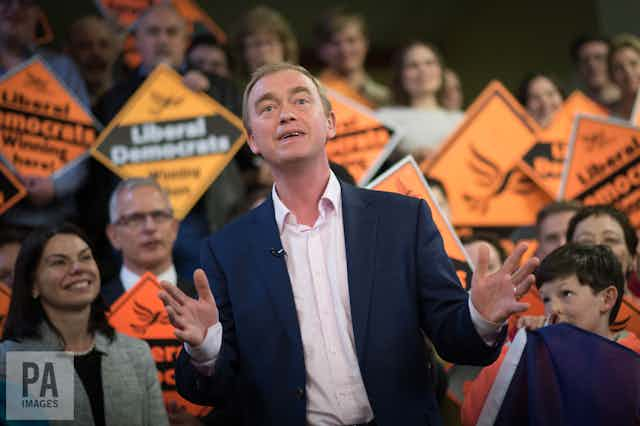Prime Minister Theresa May first crossed swords with Liberal Democrat leader Tim Farron in 1992. Both were contesting the constituency of North West Durham unsuccessfully. Now, 25 years later, May has called a snap election. She is showing surprising eagerness to revisit a struggle which has been absent from the Tories’ strategy for many years. So why is she so anxious about the Lib Dems?
Under David Cameron, the Conservatives’ approach to the Liberal Democrats fluctuated between co-operation and contempt. Prior to the coalition of 2010, Cameron notoriously described Nick Clegg as “my favourite political joke”. When rehearsing for a pre-election TV debate, Cameron used a junior researcher to play the role of Clegg while an experienced MP represented Gordon Brown. In the real life debate, real life Clegg triumphed.
Warm words were exchanged as Cameron and Clegg entered government together, but the mood had changed by the time of the next election in 2015. The Lib Dems were mentioned only once in the Conservative manifesto for that campaign – and even then it was a dismissive comparison with UKIP. On returning to office at the head of a Conservative government that year, Cameron thanked Clegg on the steps of Downing Street. But he made no mention of his former deputy prime minister’s party, which had shared government with him.
Theresa May, by contrast, has given the Lib Dems publicity. She says “they want to grind the business of government to a standstill” and has raised the spectre of a “weak and unstable coalition government led by Jeremy Corbyn, propped up by the Liberal Democrats”.
The “coalition of chaos” threat is a return to the Tory strategy of 2015, but this time the Liberal Democrats have earned a place in the rogues’ gallery alongside Labour and the SNP.
Given that, as Jeremy Corbyn pointed out, “there are nine of them and they managed to vote three different ways on Article 50”, it’s odd that the Lib Dems appear to have May so rattled. She seems to be dilating upon the threat they pose and, as Corbyn mocked, “painting herself as the prisoner of the Lib Dems”.
Pulling out an old playbook
May has decided that the Liberal Democrats, with their damaged reputation, limited resources and unashamed Remain agenda, make more convenient opponents than Labour, to whom she is showing some of the neglect Cameron once used against the Lib Dems. In an argument about Europe, the clear line between Farron’s party and the prime minister’s is more likely to drive Leave voters – including previously Labour and UKIP sympathisers – into her arms. The third party is raised up to major player status to stress the contrast between it and the government.
This strategy has a heritage going back as far as Conservative prime minister Harold Macmillan’s first negotiations to get Britain into the European Economic Community against the wishes of his own eurosceptics. In 1962, the Liberal party had captured the safe Tory seat of Orpington in a by-election similar to the victory they secured in Richmond last October. The Conservatives went on the offensive after the loss, seeking to use the Liberals’ reputation to their tactical advantage.

Macmillan and two of his party insiders, John Wyndham and Michael Fraser, conducted a lively correspondence about how the Liberals could be painted as the euro-fanatics and the government as moderate and undogmatic.
After making a speech accusing the Liberal party of jeopardising Commonwealth relations and British agricultural interests in their enthusiasm for the EEC, Macmillan wrote to Wyndham to ask “Would it be worth a private MP doing a letter on these lines?” He added: “It should be easy to show from parliamentary questions and other statements that Liberals have wanted us really to plunge into the Common Market and showing impatience over the negotiations.” A letter from Conservative MP Anthony Kershaw duly appeared in The Times. Michael Fraser was satisfied that the Liberal leadership had been embarrassed, saying “I do not think they can be very happy about it.”
Successful though this ruse was in reassuring Conservative (and possibly Labour) anti-Europeans that Macmillan was sound in the short term, it fell foul of the law of unintended consequences. The Liberal vote at the subsequent general election nearly doubled to 11.2% and the Conservatives were evicted from office by a margin of less than one percentage point.
Theresa May should therefore beware. In creating political scapegoats to recruit her own supporters, she must also be careful not to make martyrs to win the sympathies of others. Unlikely as it looks at the moment, she would not want another contest like North West Durham in 1992, in which Farron comes third but she also misses the prize.

